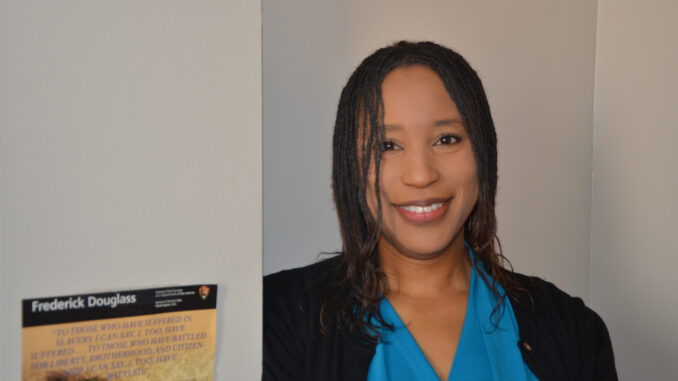
Brentaro Yamane | Layout/Multimedia Editor
Oct. 20, 2022
Kathy Glass has been teaching at Duquesne since 2004 and has taught a handful of undergraduate and graduate courses ranging from topics including African American literature, American literature as well as different writing courses.
Little does Glass know that she has had an impact on her students that have helped make their college experience feel useful and exciting.
“Having Glass as a professor has been one of the highlights of my time at Duquesne,” said student Kaitlyn Nicholson. “Her method of teaching is always clear and incites lively and timely discussions. She has a passion for her work that shines through in each of her classes.”
Glass is known as someone who can be considered an expert when it comes to race, gender and spirituality. Her expertise in those areas has easily helped students have a wide perspective on what life was back in before the civil rights movement.
“In my American Literature class, we have discussed several short stories written by people of color that allow them to tell their story,” said student Rory Brouillard. “I have learned new things such as plantation tradition and the discrimination of Native Americans in boarding schools in the early 1900s. She is very open in sharing these stories and describing their significance in literature.”
When Glass attended UCLA and University of California San Diego, her experience made her want to become a professor as her appreciation of education and literature increased.
“In college I had professors who believed stories (written and oral) had power—to educate, inspire, and create change,” Glass said. “From them, I learned the value of reading and teaching others to appreciate literature as well. While I never had the pleasure of taking a course from the late Maya Angelou, I once attended her guest lecture at my college. Her powerfully insightful presentation on storytelling practices further inspired me to pursue a career in the field.”
For some professors, one of the biggest tasks that they might have to face while teaching is making sure that their students stay attentive in class. Glass works structure her classes to make sure the students are effectively learning.
“I structure my classes by combining lecture with discussion to create an active learning environment. While lectures can provide critical information, students also learn when they ask questions, reflect on the course material, and engage in meaningful dialogue,” Glass said. “So, I often open class sessions with lectures, but I also prioritize stimulating conversations about literature to promote student learning.”
Glass has taught many students that want to be teachers after they graduate college, and she has helped students such as Ezekiel Daure want to be a teacher.
“I want to be a middle school/ high school English teacher,” Daure said. “I had an English class with her. I think as a teacher, she directed me in a way that was eye opening. We read a lot of great books like the autobiography of Malcolm X, and by reading books like that, I think it helped me be open and understanding.”
Glass continues to motivate herself to want to continue to help students learn. English students encounter different genres, cultures and literary traditions in the classroom and develop a deeper appreciation for literature,” Glass said. “I’m also motivated to help students learn because they develop skills they can use beyond Duquesne. Knowing that students are sharpening their writing, critical thinking and communication skills motivates me in the classroom.”
To her students, what makes Glass stand out compared to other professors is the content that she chooses to teach, how it’s delivered and how engaging it is.
“The class I had with her was a 400 level English class and she always made sure that our class discussions of the texts were based on what we wanted to cover,” student Kaytlin Black said. “She would have us list off some themes from the text we read that week and allow us a space to facilitate discussions that were based on our own interests, she saw us as colleagues, not mere students.”
For prospective students that are thinking about attending Duquesne to study English and education, seeing how Glass teaches could influence them.
“I enjoy many aspects of teaching,” Glass said. “But one of my favorite things is discussing literature with our students, who are curious and socially engaged. I appreciate their willingness to ask questions and explore form and content, alongside broader implications of the texts we read. Having thoughtful conversations about literature can be very rewarding.”
Glass has many students that major in many different topics, but she wants to see all her students be successful in what they do. She is always willing to lend a hand and give advice when it comes to succeeding in college and potentially landing a job.
“I’d advise students to play an active role in their learning process, ask questions, and get involved in organizations on campus,” Glass said. “Also, seek support as needed; there are resources available for students who need help. While exploring career options, they should visit the Career Services Center, which offers career planning and internship opportunities providing valuable work experience.”
Glass continues to inspire her students to become successful and that is ultimately why many of her students appreciate her and want to continue to learn more.
“One thing I’ll definitely take away from my experience with Glass is her acceptance. She makes her classroom a safe space by allowing people to share their backgrounds and using correct pronouns for students. Glass uses literature to help share stories of the oppressed to lift their voices up,” Brouillard said.

